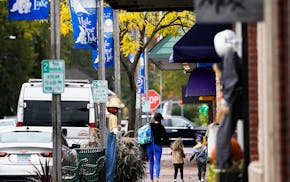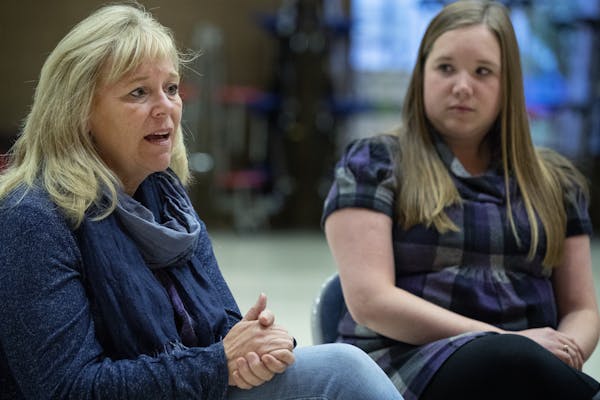Christine Blasey Ford's insistence on two front doors hit Sara Freeman the hardest.
When Ford told U.S. senators that she needed to add a second front door to her family's house, describing it as an effect of teenage sexual assault at the hands of Supreme Court nominee Brett Kavanaugh decades ago, Freeman understood it all too well.
"I've lived with PTSD for 20 years. That is trauma response," said Freeman, a south Minneapolis financial officer who said she was raped at gunpoint in a Rochester parking garage in 1998.
She, too, looks for multiple escape routes, Freeman said. She, too, has seared memories of her attack: the sound of a gun holster unsnapping, the gravelly feel of the concrete floor, waiting for silence in the moments after the attack, praying she wouldn't be shot. "Survivors don't forget this stuff."
So Freeman, like many other survivors, has been calling and faxing and e-mailing members of the Senate Judiciary Committee in recent days, urging them to vote against the appointment of Kavanaugh to the highest court in the land.
Even after the #MeToo movement unmasked the pervasiveness of sexual assault, hotlines and advocacy groups reported an increase in survivors seeking help and taking action after Ford's testimony last week before the Senate committee. Some of Kavanaugh's opponents have been standing vigil and plan to march to stop his nomination.
In Freeman's mind, and the minds of many women in the #MeToo movement, the confirmation is not just about one situation, not just about victims being heard and believed. It's about the next step.
"Originally I think the question was … are these [sex assault] numbers real?" said Sarah Super, a sexual assault survivor and founder of Break the Silence in Minnesota. "Now I feel like we recognize that it is pervasive, it happens close to us. Now the question that remains is: Does this matter and do people care?"
Ford is more credible than Kavanaugh, they contend, pointing not only to evidence of her trauma response, but also the statements she made to her therapist and others about Kavanaugh long before he was a Supreme Court nominee.
"I think everything about her testimony shows us that she's willing to say what she doesn't know or doesn't remember," said Megan Peterson, executive director of the St. Paul-based nonprofit Gender Justice. "She seems crystal clear about the fact that she knows that it's him."
Kavanaugh critics understand, though, that he has many supporters, some of whom believe Ford has been put forward for political reasons.
"I point to Neil Gorsuch," said Freeman, who sits on the board of directors for the Domestic Abuse Project. "He went before the same Senate Judiciary Committee. He had the exact same background check … liberals like me had the same objections to him being on the Supreme Court … and there was not one iota of allegations of either inappropriate behavior or misconduct. Not one."
And while the judicial system is set up to ensure due process — something Kavanaugh's supporters say he hasn't received — those who oppose his nomination point out that he is interviewing for a job; he's not on trial.
"He's not going to lose his liberty and be incarcerated. He is going to walk a free man even if the FBI investigation says this accusation is valid," Super said. "He is not going to be held accountable in any regard except for not getting an even more prestigious job than the one he currently has."
The accusations against Kavanaugh helped spur the explosion of the social media hashtag #whyididntreport, a vehicle for survivors to explain why Ford didn't go to police and didn't come forward earlier.
Freeman said Kavanaugh appeared in his testimony to be someone who was such an excessive drinker that he might not remember an encounter such as Ford describes — and might view it as inconsequential.
"The issue that people tend to miss is the issue of consent," said Rachael Joseph, executive director of Survivors Lead, an advocacy group for survivors of gun, sexual and domestic violence. "I've had people say that Al Franken didn't pin someone down … no he didn't, but he didn't have consent to do what he did."
Freeman, a Democrat who recently made a bid for the Legislature, said she is "disappointed and discouraged" that some members of her party — even as they support Ford — have attacked a local woman who accused state attorney general candidate Keith Ellison of assault.
"This is not a partisan issue and shouldn't be viewed through a partisan lens," she said.
But even with a groundswell of opposition from women buoyed by the #MeToo movement, survivors said they are preparing for the possibility that Kavanaugh will be confirmed regardless of what the FBI finds.
"It will be an excruciating day for survivors of sexual violence, and it will be just another day in so many ways that we hear that our safety and our healing and our justice doesn't matter," Super said.
Even then, they have vowed to keep pushing to change what they describe as "rape culture," both at election time and at a planned women's march early next year.
"We are not going to see Justice Kavanaugh elevated to the highest court in the land and then be silent about this," Freeman said. "We are going to vote in high numbers Nov. 6 and march in high numbers Jan. 19, and we will not be silent again or silenced."
Pam Louwagie • 612-673-7102

Shop the curbs for free on 'Trash to Treasure Day' in White Bear Lake

Longtime Uptown boutique closing in May

Meet the Athena Award winners: 103 female athletes honored by their schools

Lacrosse lists: 21 top players and the school that's No. 1 for boys and girls

